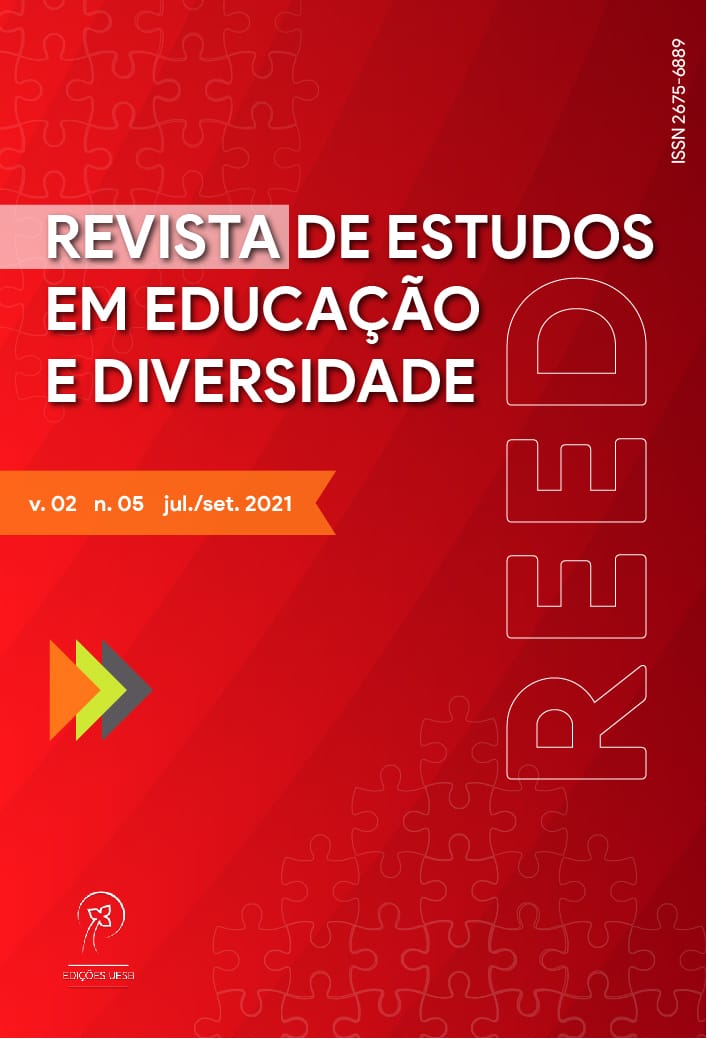DIALOGICIDADE EM TEMPOS DIGITAIS: O LEGADO DE PAULO FREIRE À CONSTITUIÇÃO DA PRÁXIS DOCENTE (RE)EXISTENTE
DOI:
https://doi.org/10.22481/reed.v2i5.9191Keywords:
Mídias na educação, Paulo Freire, Práxis docente (re)existente.Abstract
The present investigation aimed to identify the legacy of Paulo Freire to the constitution of the (re)existing teaching praxis in view of the insertion of media in education in a dialogical perspective. A theoretical research was carried out, directed to the studies of Paulo Freire on the subject. Based on dialogicity and criticality, it establishes relationships that can be enhanced by the media and proposes a political reflection on its role in dialogic education, considering its intentions. Is this regard, the insertion of media in the teaching praxis does not overshadow the presence of the teacher in the process, but enhances it, signaling a new way of existing in it. The text points to the contributions of Freire to a dialogic education permeated by the media for the 21st century. It challenges new perceptions of education, school, teacher, politics, media, and warns about student protagonism and rigor in school spaces, in addition to the need to (re)exist through the consolidation of dialogue, as a founding principle of teaching praxis.
Downloads
References
FERNANDES, Calazans e TERRA, Antônia. 40 horas de esperança: o método Paulo Freire - política e pedagogia na experiência de Angicos. São Paulo: Ática, 1994.
FREIRE, Paulo. Conscientização: teoria e prática da libertação – uma introdução ao pensamento de Paulo Freire. 3. ed. São Paulo: Moraes, 1980.
FREIRE, Paulo. Educação e mudança. Tradução: Moacir Gadotti e Lílian Lopes Martin. 5. ed. Rio de Janeiro: Paz e Terra, 1982.
FREIRE, Paulo. Pedagogia da Esperança: Um reencontro com a Pedagogia do Oprimido. Notas: Ana Maria Araújo Freire. Rio de Janeiro: Paz e Terra, 1992.
FREIRE, Paulo. À sombra desta mangueira. 2. ed. São Paulo: Olho d'Água, 1995.
FREIRE, Paulo. A importância do ato de ler: em três artigos que se completam. 32. ed. São Paulo: Cortez, 1996.
FREIRE, Paulo. Política e educação: ensaios. 3. ed. São Paulo: Cortez, 1997. (Coleção questões de nossa época, v. 23).
FREIRE, Paulo. Educação como prática da liberdade. 23. ed. Rio de Janeiro: Paz e Terra, 1999a.
FREIRE, Paulo. Pedagogia do oprimido. 26. ed. Rio de Janeiro: Paz e Terra, 1999b.
FREIRE, Paulo. A educação na cidade. 4. ed. São Paulo: Cortez, 2000a.
FREIRE, Paulo. Pedagogia da indignação: cartas pedagógicas e outros escritos. São Paulo: Editora UNESP, 2000b.
FREIRE, Paulo. Pedagogia dos sonhos possíveis. Organizadora: Ana Maria Araújo Freire. São Paulo: Editora UNESP, 2001.
FREIRE, Paulo. Pedagogia da autonomia: saberes necessários à prática educativa. 33. ed. São Paulo: Paz e Terra, 2006.
FREIRE, Paulo. Extensão ou Comunicação? 15. ed. São Paulo: Paz e Terra, 2011.
MALDONADO, Alberto Efendy. Pesquisa em comunicação: trilhas históricas, contextualização, pesquisa empírica e pesquisa teórica. In: MALDONADO, Alberto Efendy. Metodologias de Pesquisa em Comunicação. Porto Alegre: Sulina, 2011. p. 279-303.
WALSH, Catherine. “Interculturalidad, crítica y pedagogía de-colonial: apuestas (des)de el in-surgir, re-existir y re-vivir”. In: MELGAREJO, Patricia (ed.). Educación Intercultural en América Latina: memorias, horizontes históricos y disyuntivas políticas. México: Universidad Pedagógica Nacional-CONACIT, Plaza y Valdés, 2009.
Downloads
Published
How to Cite
Issue
Section
License
Copyright (c) 2021 Revista de Estudos em Educação e Diversidade - REED

This work is licensed under a Creative Commons Attribution 4.0 International License.
You are free to:
Share - copy and redistribute the material in any medium or format; Adapt - remix, transform, and build from the material for any purpose, even commercially. This license is acceptable for Free Cultural Works. The licensor cannot revoke these freedoms as long as you follow the terms of the license.
Under the following terms:
Attribution - You must appropriately give credit, provide a link to the license, and indicate if any changes have been made. You may do so in any reasonable way, but not in a way that suggests that you or your use is endorsed by the licensor.
There are no additional restrictions - You cannot apply legal terms or technological measures that legally restrict others to make any use permitted by the license.












